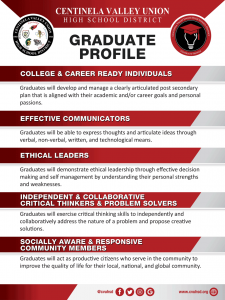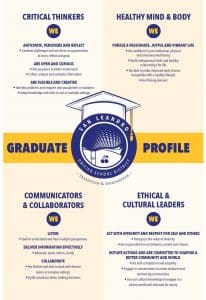The Opportunity for a California Profile of a Graduate
Education Domain Blog

This post was originally published by Scaling Student Success on June 1, 2020.
What does it mean for young people to be prepared for future success? Are the competencies, skills, and mindsets universal, or do they vary from community to community, state to state, and country to country? How can we anticipate the needs in a world that is so unpredictable, as we have learned over the past few months? Even if we are not confident in our ability to predict the future, can we still rely on the most current research to identify the skills most likely to catapult our young people confidently into their futures?
College and Career Readiness Defined
Several states have been proactive in answering these questions. They have named the competencies that they believe represent what young people will need to succeed in college, career, and civic life. According to a 2014 report by American Institutes for Research (AIR), 35 states and the District of Columbia had defined college and career readiness. Some have gone further and created a Graduate Profile – see examples from Virginia, South Carolina, and New Mexico. These states articulate a broader definition of student success because they believe that, while the Common Core Standards, Next Generation Science Standards, and the associated assessments build a necessary foundation for college and career readiness, the academic core, in and of itself, is not sufficient to holistically and equitably prepare all young people for future success.
Several leading organizations have pushed for states and communities to develop a Graduate Profile. For the past decade, ConnectED: The National Center for College and Career, has promoted Graduate Profile development for school districts and communities in which they support the rollout of Linked Learning pathways. In recent years, through its Portrait of a Graduate initiative, Battelle for Kids has encouraged districts to move in this direction. Now, many other non-profit support providers and for-profit consulting groups actively endorse this national trend. And recently, the Aurora Institute (formerly iNACOL) published a policy brief, in which they identified the top issues to address in state policy for transforming our K-12 education system. The #1 recommendation (of 11) calls for defining “student success through a Profile of a Graduate to create a vision to modernize and redefine more holistic graduation requirements based on what students need to know and be able to do for future success.”
California’s Opportunity
California is the largest and most diverse state in the nation. That alone makes defining student success and/or creating a Graduate Profile a daunting challenge. That said, back in 2012, when ConnectED was serving as a California hub for promoting college and career pathways, they partnered with WestEd to do a field analysis and draft a research-based report, called “College and Career Readiness: What Does It Mean?” That was a good start, and since then the State Board has done much to better incorporate measures of college and career readiness into the state’s reporting system. Moving forward, the state of California could blend prior efforts and create an updated definition.
An Innovative Approach
But, there is another, perhaps better, option — one that values and leverages the experiences of local school districts. Lacking a state definition for college-, career-, and civic-readiness, a growing number of CA school districts have engaged their local communities to create their own Graduate Profiles to more broadly define student success based on their local values, priorities, and circumstances. A new CA partnership, called Scaling Student Success, has formed a community of practice among those school districts. Rather than just hanging their Graduate Profiles on the walls as aspirational posters, Scaling Student Success districts are fully committed to moving “from poster to practice” – i.e., fully operationalizing the Profiles in a way that holds the district and community collectively accountable for ensuring that each and every student has an equitable opportunity to develop and demonstrate the competencies articulated on the Graduate Profile.
In 2013-14, California enacted the Local Control Funding Formula (LCFF), funding schools based on need and prioritizing local control as a driving force for continuous improvement and accountability. Local control has been embraced by the State Board of Education, Department of Education, and local school boards. As a grassroots approach that honors the spirit of LCFF, state leaders could (1) gather Graduate Profiles from districts around the state, (2) complete an analysis of common features, and (3) use those cross-district, cross-community results to inform a statewide definition of the future-ready student and/or create a CA Graduate Profile that would incentivize local efforts.
Doing Better for Our Kids
The CA School Dashboard has been celebrated across the country as an effective multi-dimensional tool for reporting school quality. Its College/Career Indicator (CCI) captures many measures, such as completion of a sequence of courses and performance on standardized tests. Unfortunately, the measures are limited to data that the state can easily and consistently collect from school districts. One could argue that the result is merely a hodge-podge of proxies that may, or may not, indicate student readiness. As educators, families, and community members, do we have any reassurance that students who complete a subset of these indicators are well prepared to face an unpredictable future? What if the Dashboard actually mapped student demonstration of competencies to a research-based definition of student success or a Graduate Profile? Could we improve our confidence that our young people are prepared for their futures?
As we recover from COVID-19, local, state, and national education leaders are re-imagining a new way forward. Perhaps now is the perfect time to reset both local and state accountability measures to better align with a set of more holistic and equitable outcomes for our young people. Doing so could reinforce recent recommendations by State Board of Education president, Linda Darling-Hammond, by opening opportunities to emphasize authentic learning and assessments, ensuring supports for social and emotional development, and redesigning schools for stronger relationships.
What if districts made their Graduate Profile outcomes the focal point of their Local Control and Accountability Plans (LCAP)? What if the state used the opportunity to more broadly define student success based on research-based indicators, rather than limiting itself to the most accessible measures? Our young people deserve an education system that fully prepares them for the challenges ahead. We cannot allow history, bureaucracy, or personal and organizational comfort to limit the learning outcomes and future opportunities that define success for the students we serve. Let’s take a stand and invest in our children.
Let’s start a statewide dialog about student- and equity-centered needs and possibilities.
Roman Stearns is Founder & Executive Director of Scaling Student Success, a California partnership dedicated to educating the whole child. Scaling Student Success is currently welcoming new districts into Cohort 2 of the Community of Practice. If your district either has a Graduate Profile, or is thinking about creating one, and you believe that you may benefit from being part of a networked improvement community, please email [email protected].

